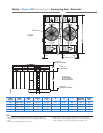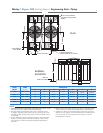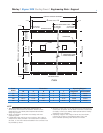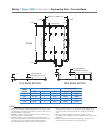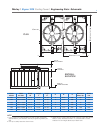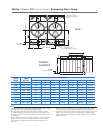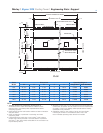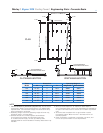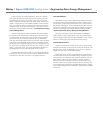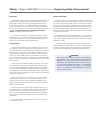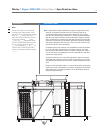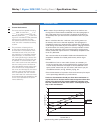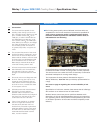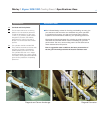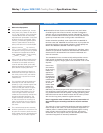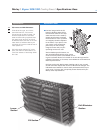
Marley
/
Sigma 1000/1200 Cooling Tower
/
Engineering Data: Energy Management
12
Cooling towers are usually selected to produce a specific
cold water temperature at the higher summer-time wet-bulb
temperatures. During the remainder of the year, the cooling
tower is capable of producing much colder water. Unless your
system will benefit from the coldest possible water tempera-
ture, you should consider controlling cold water temperatures
to higher levels. You’ll also save energy by using such control.
See Marley Technical Report #H-001A, “Cooling Tower Energy
and its Management”.
Always control leaving water temperature by manipulating
the quantity of air that the fan moves through the tower. Vary-
ing the quantity of water flow is not normally recommended
and can be harmful in freezing weather. You can alternately
start and stop single-speed motors to maintain water tempera-
tures within an acceptable range. However, exceeding a total
acceleration time of 30 seconds per hour can overheat the mo-
tor, causing the insulation to fail. Limiting the number of motor
starts, on the other hand, can produce significant variations in
the temperature of the water delivered to the process.
Increased flexibility can simplify your operating procedures
and save you money in the long run, both on operation and on
maintenance. Here are two of the more popular options.
Two-Speed Motors
Two-speed motors improve operating flexibility by increas-
ing the number of potential operating modes. Users in north-
ern climates will find that the tower can carry winter loads at
half-speed; reducing fan power requirements by 85+% during
that time. Two-speed motors also help to control icing during
wintertime operation. See Marley Technical Report #H-003,
“Operating Cooling Towers During Freezing Weather”.
Normally, two-speed motors are provided in 1800/900
RPM, single winding configuration, which is the least expen-
sive two-speed option. They are also available in other combi-
nations including the more expensive double winding.
Variable Speed Control
Frequency modulation devices work well on induced draft,
propeller fan cooling towers such as the Sigma. However, their
design must include the capability to lock out any critical fan
speeds and the very low fan speed ranges.
Marley VFD drive systems are designed to combine abso-
lute temperature control with ideal energy management. The
cooling tower user selects a cold water temperature and the
drive system will vary the fan speed to maintain that tem-
perature. Precise temperature control is accomplished with
far less stress to the mechanical equipment components. The
improved energy management provides fast payback. Indeed,
many utilities offer generous rebates for users having installed
VFD drives.



